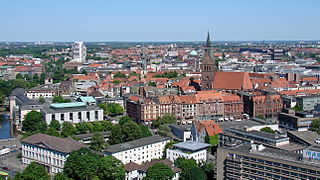
Hanover is the capital and largest city of the German state of Lower Saxony. Its 534,049 (2020) inhabitants make it the 13th-largest city in Germany as well as the third-largest city in Northern Germany after Hamburg and Bremen. Hanover's urban area comprises the towns of Garbsen, Langenhagen and Laatzen and has a population of about 791,000 (2018). The Hanover Region has approximately 1.16 million inhabitants (2019).

Choreography is the art or practice of designing sequences of movements of physical bodies in which motion or form or both are specified. Choreography may also refer to the design itself. A choreographer is one who creates choreographies by practising the art of choreography, a process known as choreographing. It most commonly refers to dance choreography.
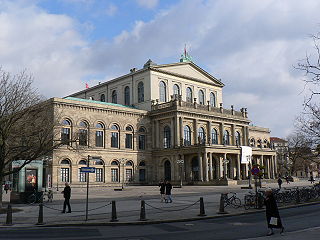
Staatsoper Hannover is a German opera house and company in Hanover, the state capital of Lower Saxony. It is part of the Niedersächsische Staatstheater Hannover, which puts on operas, stage productions, and concert programs. It consists of the divisions Schauspiel Hannover, Staatsballett Hannover, Staatsorchester Hannover and Theatermuseum Hannover. Its season runs from September to June.

Gustav Friedrich Wilhelm Großmann was a German actor, writer, and stage director. He wrote the text of the famous operatic Schauspiel mit Gesang Adelheit von Veltheim, with music by Christian Gottlob Neefe.

Hochschule für Musik, Theater und Medien Hannover (HMTMH) is an artistic-scientific university in Hanover, Lower Saxony, Germany. It dates back to 1897. From 1962 until 2010 it was named Hochschule für Musik und Theater Hannover, short: Musikhochschule Hannover. Since 2010, the president has been Susanne Rode-Breymann. As of 2013, the university has approximately 1,443 students, taught by 361 teachers in 33 courses for musicians, actors, music teachers, musicologists and media scholars.
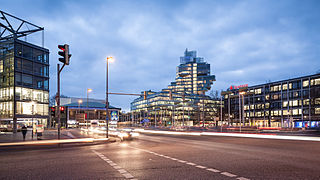
The Aegidientorplatz, colloquially known as Aegi is a busy square in Hanover located above the U-bahn station of the same name. The square was named for the Aegidientor, one of the city gates of Medieval Hanover, which existed until 1780.
The following is a timeline of the history of the city of Hanover, Germany.
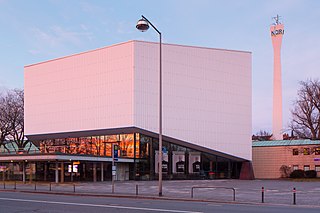
Landesfunkhaus Niedersachsen is a group of buildings of the public broadcaster Norddeutscher Rundfunk in Hanover, the state capital of Lower Saxony.

The Schauspiel Hannover is part of the theatre organisation of the German state of Lower Saxony in its capital, Hanover, the Niedersächsische Staatstheater Hannover. The other part is the Staatsoper Hannover. Schauspiel offers theatre, entertainment and music on five stages, the Schauspielhaus, the Cumberlandsche Bühne, the Cumberlandsche Galerie, and the historic buildings in Old Town, Ballhof Eins and Ballhof Zwei.
The term Landesbühne or Landestheater is added to the name of some publicly owned theatre companies in Germany and Austria. These companies have a mandate to perform in areas without public theatres. Less than half of performances usually take place at the seat of a Landesbühne, thereby distinguishing them from the so called Stadttheater or Staatstheater. Legal control can lie with the respective Bundesland or a collaboration of several municipalities and local authorities. The spectrum of presented productions can be very diverse. The repertoire can include all or parts of the popular disciplines: play, musical theatre, ballet, and children's and youth theatre.
Heinrich Lutter was a German pianist and piano educator.
Hugo Thielen is a German freelance author and editor, who is focused on the history of Hanover, the capital of Lower Saxony, in a lexicon of the city, another one especially of its art and culture, and a third of biographies. He co-authored a book about Jewish personalities in Hanover's history.
Heinrich Sievers was a German musicologist, music critic, University lecturer and conductor. He was regarded as the Nestor of the history of music in Hanover as well as of the State Niedersachsen. and wrote music-historical monographs also in English and Finnish publications.
Waldemar R. Röhrbein was a German historian. He worked as a museum director in Lower Saxony, his last post being from 1976 to 1997 at the Historisches Museum Hannover, and was president of the Niedersächsischer Heimatbund. He contributed to encyclopedias about Hanover's history and culture.

Historisches Museum Hannover is a historical museum Hanover, Lower Saxony, Germany, founded in 1903 as Vaterländisches Museum der Stadt Hannover. Its collections are related to the history of the city, the history of the governing House of Welf, and of the state of Lower Saxony.
Gotthard Kronstein was a German operatic baritone and theatre director.
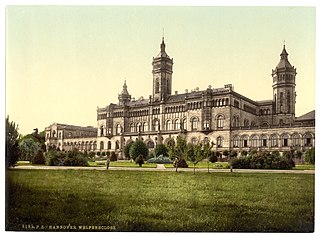
Christian Heinrich Tramm was a German architect who, in 1850, introduced the Rundbogenstil in Hanover.
Adolf Falke was a German architect, draughtsman, designer, stage designer and municipal politician.
Hannover Concerts is a concert agency from Hanover. The company is considered one of the largest concert promoters in northern Germany.
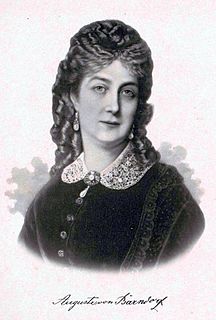
Auguste von Bärndorf was a German stage actress.













